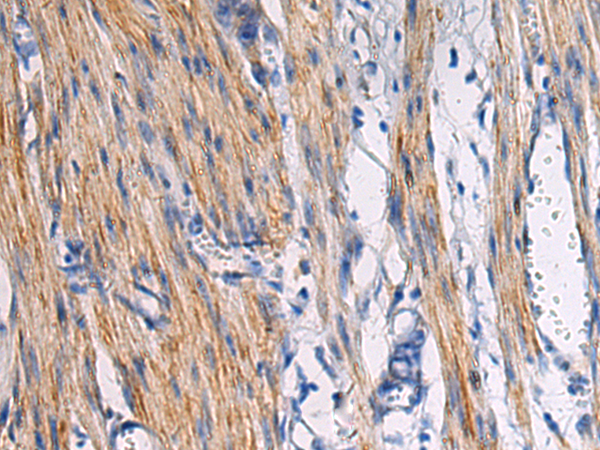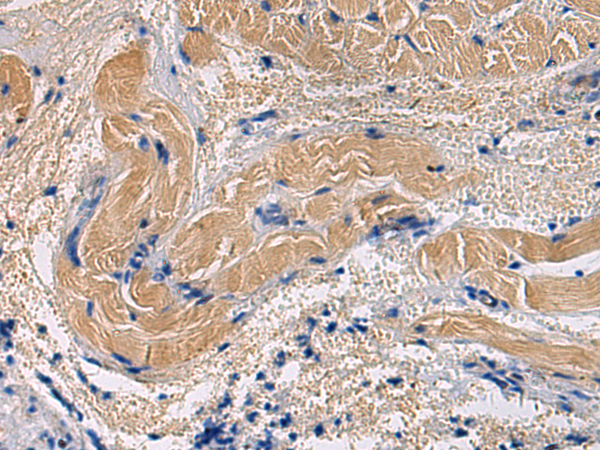

| WB | 咨询技术 | Human,Mouse,Rat |
| IF | 咨询技术 | Human,Mouse,Rat |
| IHC | 1/50-1/200 | Human,Mouse,Rat |
| ICC | 技术咨询 | Human,Mouse,Rat |
| FCM | 咨询技术 | Human,Mouse,Rat |
| Elisa | 1/5000-1/10000 | Human,Mouse,Rat |
| Aliases | DER7; GCS1; CDG2B; CWH41 |
| Host/Isotype | Rabbit IgG |
| Antibody Type | Primary antibody |
| Storage | Store at 4°C short term. Aliquot and store at -20°C long term. Avoid freeze/thaw cycles. |
| Species Reactivity | Human |
| Immunogen | Synthetic peptide of human MOGS |
| Formulation | Purified antibody in PBS with 0.05% sodium azide and 50% glycerol. |
+ +
以下是关于MOG抗体的3篇代表性文献摘要,供参考:
1. **标题**:*MOG antibody-associated disorders: differences in clinical features and therapeutic outcomes between pediatric and adult patients*
**作者**:Cobo-Calvo A, et al.
**摘要**:该研究对比了儿童与成人MOG抗体相关疾病(MOGAD)患者的临床特征和预后,发现儿童患者更易出现视神经炎和广泛性脑炎症状,而成人复发率较高。研究强调年龄对疾病表型及治疗反应的影响。
2. **标题**:*Pathogenic and targetable biomarkers for MOG-antibody-associated disease beyond the MOG antibody*
**作者**:Jarius S, et al.
**摘要**:文章探讨了MOGAD中除MOG抗体外的其他生物标志物,如细胞因子谱和补体激活途径,提出联合多指标检测可能提升诊断准确性及指导靶向治疗。
3. **标题**:*Rituximab versus intravenous immunoglobulin for relapsing MOG antibody-associated disease: a prospective observational study*
**作者**:Chen JJ, et al.
**摘要**:前瞻性研究比较利妥昔单抗与静脉免疫球蛋白(IVIG)对复发性MOGAD的疗效,显示利妥昔单抗显著降低复发率,但部分患者需联合治疗,提示个体化治疗策略的重要性。
**注**:以上文献均发表于2020-2023年间,涵盖临床分型、生物标志物和治疗策略,反映当前研究热点。如需具体文献来源,可补充说明研究方向(如基础机制/临床管理)以便进一步筛选。
MOGS (mannosyl-oligosaccharide glucosidase), also known as glucosidase I, is an endoplasmic reticulum-resident enzyme critical for N-glycosylation, a process essential for protein folding and quality control. It catalyzes the removal of terminal glucose residues from nascent glycoproteins, a key step in the calnexin/calreticulin chaperone cycle. Mutations in the *MOGS* gene cause congenital disorder of glycosylation type IIb (CDG-IIb), a rare autosomal recessive disease characterized by severe neurodevelopmental defects, immunodeficiency, and skeletal abnormalities.
Anti-MOGS antibodies, though less studied compared to other autoimmune targets, have been implicated in rare autoimmune or paraneoplastic conditions. These antibodies may disrupt glycoprotein processing, potentially contributing to cellular dysfunction. However, their clinical significance remains unclear due to limited reported cases. Research primarily focuses on genetic *MOGS* defects rather than acquired antibody-mediated pathologies. In contrast, myelin oligodendrocyte glycoprotein (MOG)-specific antibodies are well-established biomarkers in demyelinating disorders like MOG antibody-associated disease (MOGAD), highlighting the distinction between MOGS (enzyme) and MOG (myelin protein). Further studies are needed to elucidate the role of MOGS antibodies in human diseases.
(Word count: 199)
×